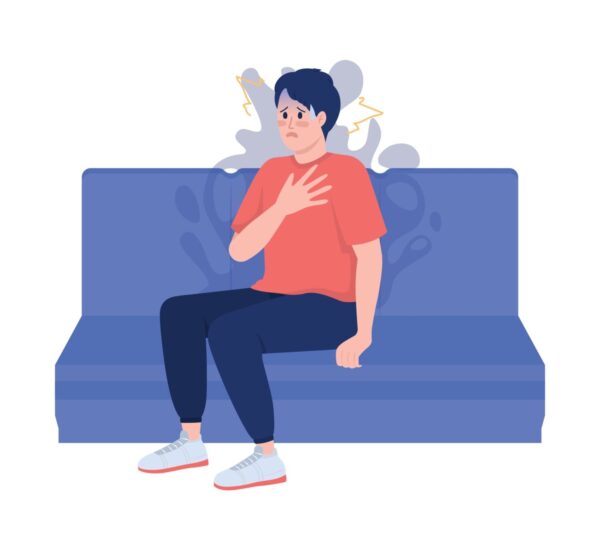By Rebecca Sanderson – Director of The Mindset Clinic
Date: 7th October 2025
Understanding Panic Attacks
Effective hypnotherapy for panic attacks can be life changing.
In my practice at The Mindset Clinic in Radlett near Watford, I help clients understand that panic attacks are not life-threatening, even though they feel intense. By recognising the patterns and triggers, we can begin to break the cycle of fear and avoidance. This is where hypnotherapy becomes a powerful tool, helping you regain control and restore calm in your daily life.
Panic attacks can feel overwhelming and frightening, often striking without warning. I know this not only from my professional work but also from personal experience—I used to suffer from them myself. That’s why I truly understand how distressing they can be. These episodes are typically linked to the body’s fight or flight response, which becomes activated even when there is no real danger. This can be triggered by chronic stress, unresolved trauma, or underlying anxiety conditions.
What are Panic Attacks?
Panic attacks are sudden surges of intense fear or discomfort that peak within minutes. They can be triggered by specific situations or occur unexpectedly. Common symptoms include a racing heart, shortness of breath, chest pain, dizziness, and a sense of detachment from reality. Many people also experience a fear of losing control or dying.
These symptoms are caused by the body’s autonomic nervous system going into overdrive. While panic attacks are not harmful, the fear of having another one can lead to avoidance behaviours and increased anxiety. Understanding that these sensations are a misinterpretation of normal bodily responses is key. Hypnotherapy helps reframe these responses and reduce the frequency and intensity of attacks.
Common Symptoms and Triggers of Panic Attacks
In my experience, panic attacks can present with a wide range of physical and emotional symptoms. These include (but are not limited to):
- a pounding heart
- trembling
- sweating
- nausea
- a sense of unreality
- an inability to focus or concentrate
Emotionally, clients often describe feeling overwhelmed, fearful, or detached. These symptoms usually peak within ten minutes but can leave a lasting emotional impact.
Triggers vary widely. Some people react to specific situations like public speaking or crowded places, while others respond to internal cues such as negative thoughts or changes in heart rate. Chronic stress, unresolved trauma, and certain medical conditions can also contribute. The NHS and Mind offer helpful resources for understanding these triggers. Hypnotherapy allows us to explore and reframe these subconscious patterns, offering lasting relief.
The Role of Hypnotherapy in Treating Panic Attacks
How Hypnotherapy works
Hypnotherapy guides you into a deeply relaxed and focused state where your subconscious mind becomes more receptive to positive change. In this state, we can access the deeper mental patterns that influence your thoughts and behaviours. This allows us to identify and reframe the triggers that contribute to panic attacks.
During sessions, I use techniques such as guided imagery and post-hypnotic suggestion to help you reinterpret sensations like a racing heart or shortness of breath. These are no longer seen as threats but as manageable experiences. Hypnotherapy also allows for mental rehearsal of stressful scenarios, helping you build resilience and confidence. In addition to hypnotherapy I use a range of other very powerful techniques such as NLP and Timeline Therapy.
Benefits of Hypnotherapy for Panic Attacks
One of the most powerful benefits of hypnotherapy is its ability to interrupt the panic cycle. By working at the subconscious level, we can change how you interpret bodily sensations and stressful situations. Instead of reacting with fear, you learn to respond with calm and control.
Clients often develop cue-controlled relaxation techniques, anchoring a calming word or breath pattern to a relaxed state. This becomes a reliable tool in daily life. Hypnotherapy also helps uncover and resolve emotional triggers, offering long-term relief. It’s a safe, drug-free approach that complements other therapies and supports your journey to emotional resilience.
Hypnotherapy Techniques for Panic Attacks
Visualisation Techniques
Visualisation is a technique I use often in hypnotherapy sessions at The Mindset Clinic. It involves imagining peaceful, safe environments that help shift your focus away from anxiety. Whether it’s a quiet beach or a warm light, these images activate your parasympathetic nervous system and promote calm.
I also use visualisation to mentally rehearse challenging situations. For example, you might imagine entering a crowded space while remaining calm. This helps desensitise your mind to triggers and builds confidence. Symbolic imagery, like anxiety dissolving into clear skies, allows your subconscious to process fear in a non-threatening way.
Relaxation Techniques
Relaxation techniques are essential in managing panic attacks. In hypnotherapy, I guide clients through progressive muscle relaxation, focused breathing, and calming visualisations. These techniques help retrain your body to respond to stress with calm rather than panic. I often find clients have learnt to breathe incorrectly and often tell me that breathing techniques aren’t helpful. When I get them to show me how they are breathing or how they have interpreted a breathing technique they’ve seen online or been recommended, 90% of the time they are doing it wrong. No wonder they have not found much relief from breathing techniques!
Progressive muscle relaxation involves tensing and releasing muscle groups to reduce tension. Breathwork, especially slow diaphragmatic breathing, helps regulate your nervous system. I often pair breathing with calming phrases or imagery, creating a reliable anchor you can use anytime. These techniques become automatic responses, empowering you to manage anxiety effectively.
Finding a Qualified Hypnotherapist in Radlett near Watford.
Finding the right hypnotherapist is key to your healing journey. In Radlett, there are several qualified practitioners to choose from, but it’s important to choose someone accredited by bodies like the General Hypnotherapy Register (GHR) or Complementary and Natural Healthcare Council (CNHC). Hypnotherapy is unregulated and so its wise to check where they trained to ensure it is of a high standard. I trained at The London College of Clinical Hypnotherapy which was affiliated to the University of West London. It was one of the only places to study hypnotherapy at Post Graduate level. Many hypnotherapy schools offer so called diplomas in hypnotherapy but many are not accredited courses. You can also explore directories like the Hypnotherapy Directory or the General Hypnotherapy Register to compare qualifications and reviews. Be aware that some hypnotherapists list lots of letters after their name to make themselves appear more qualified than they are.
At The Mindset Clinic, I offer a free initial consultation to help you feel comfortable and supported. Always take up the offer of speaking to a hypnotherapist before you decide to book a session. I also recommend that you check out several hypnotherapists locally so that you get a sense of who you feel most comfortable with. A good hypnotherapist will not need to use pushy sales techniques. They will tailor sessions to your needs and empower you with tools for long-term emotional wellbeing. Usually, but not always, the more experienced the hypnotherapist the more they will charge.
Other factors you may want to consider when deciding on who to work with is do they offer face to face and online consultations. Will you feel comfortable working with a hypnotherapist in their own home or would you prefer a more neutral and professional setting? My therapy room is located in the beautiful setting of Battlers Green Farm where I can give you my undivided attention free from interruption from family members and delivery drivers. Its quiet and peaceful and the entrance is discreet. Parking is free and plentiful.

Rebecca Sanderson Clinical Hypnotherapist
Rebecca Sanderson is a Clinical Hypnotherapist and Mindset Coach with over 10 years of experience. She is the Director of The Mindset Clinic in Radlett near Watford, Hertfordshire and uses rapid and dynamic therapeutic interventions to help people live healthier, happier lives. She is a Master Hypnotist, Master Coach and Master Practitioner of NLP as well as being trained in CBT, EMDR and ERPT.
If you would like to discuss how she can help you, She would love to hear from you. Get in touch here.

